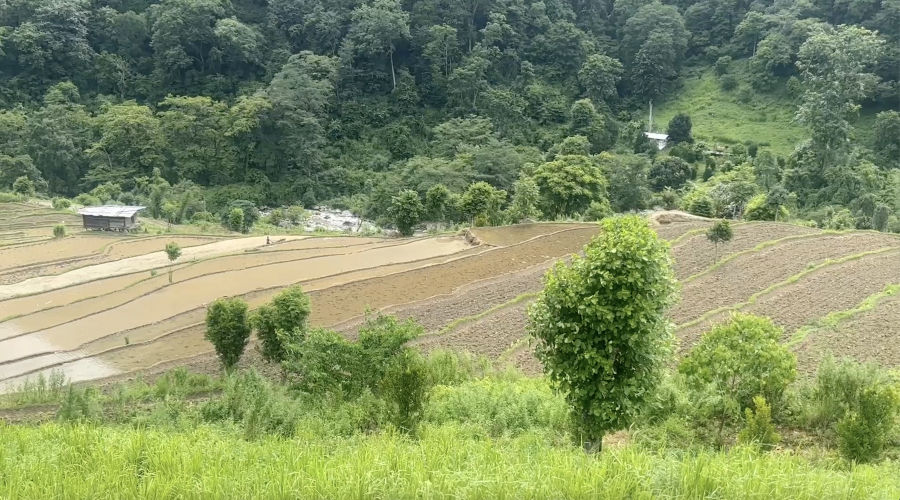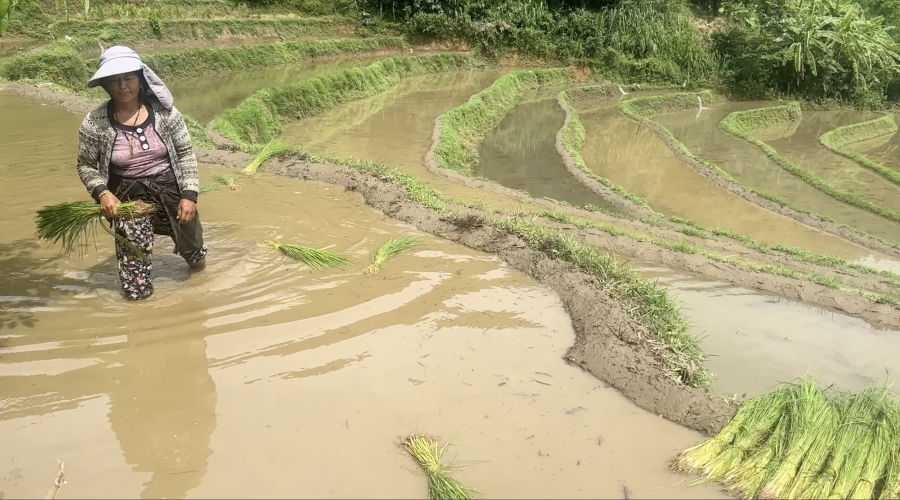 Paddy transplantation in Thridangbi, Monggar, is constantly becoming challenging for the local farmers. The main issue is the shortage of irrigation water, which mostly depends on increasingly erratic and seasonal rainfall. Locals attribute this worsening situation to the impacts of climate change, leaving them feeling helpless and without viable solutions.
Paddy transplantation in Thridangbi, Monggar, is constantly becoming challenging for the local farmers. The main issue is the shortage of irrigation water, which mostly depends on increasingly erratic and seasonal rainfall. Locals attribute this worsening situation to the impacts of climate change, leaving them feeling helpless and without viable solutions.
Thridangbi is located about fifty kilometres from Monggar towards Bumthang. There are more than 30 acres of paddy fields here at Thridangbi. It belongs to 25 households. But today, most of the farmers are worried about paddy cultivation.
The fields are prepared for transplanting paddy. They grow a high-quality rice called Tsirang-zam, which sells at a good price. They rely on a small rain-fed stream to irrigate their fields, with water shared on a rotational basis.
Today, it’s Jigme Dema’s turn to use the water. She is under pressure to finish quickly, so the next farmer can use the water. They say the water is drying due to erratic and less rainfall. A farmer takes weeks to complete paddy transplantation. So far, only three households have done it.

Time is their worst enemy; delays in transplanting can affect the harvest. Normally, the work finishes by this time.
“These days, there is no rain at all. Last month, during the maize season when we didn’t need rain, it rained a lot. But now, when we need rain, it is not raining. The paddy seedlings are also drying up because of delays caused by the water shortage. We have to wait for our turn to start planting paddy, but due to the scarce water supply, the wait is long. Those waiting for their turn have to wait even longer. If we delay paddy cultivation, it affects the harvest, so we often end up quarrelling,” said Jigme Dema, Farmer, Thridangbi, Monggar.
“When it rains, it pours so heavily that it causes floods, and when it doesn’t, there is a total drought. Due to such drought, many acres of fields lie fallow today, just about 100–150 meters from here. We can’t say exactly how much, but many people have left their fields fallow; otherwise, that entire area is terraced,” said Rinzin Dorji, Farmer, Thridangbi, Monggar.
On the other side, Sherab Tenzin is busy ploughing a three-acre field. He doesn’t own the land but farms it by sharing the produce with the landowner. However, Sherab is unsure if he will be able to grow paddy this year. He recalls how he left the fields fallow in 2016 due to scarce water and lack of rain.
“Currently, I am ploughing the field to prepare for paddy transplantation and hoping for rain anytime soon. Otherwise, I will have to leave the field fallow, like in 2016 when there was no rain at all. Since then, the water shortage has become rampant. We have to leave the field fallow because it will be too late to grow maize as well,” said Sherab Tenzin, Farmer, Thridangbi, Monggar.
Recently, a team of local officials visited Thridangbi to study both temporary and permanent solutions to the water shortage. However, farmers say this issue has been raised many times in several meetings. Similar visits and studies have happened before, but nothing has changed.
They say that until a real solution is implemented, the people of Thridangbi will continue to blame climate change and pray for timely rain.
Namgay Wangchuk, Monggar
Edited by Tandin Phuntsho








